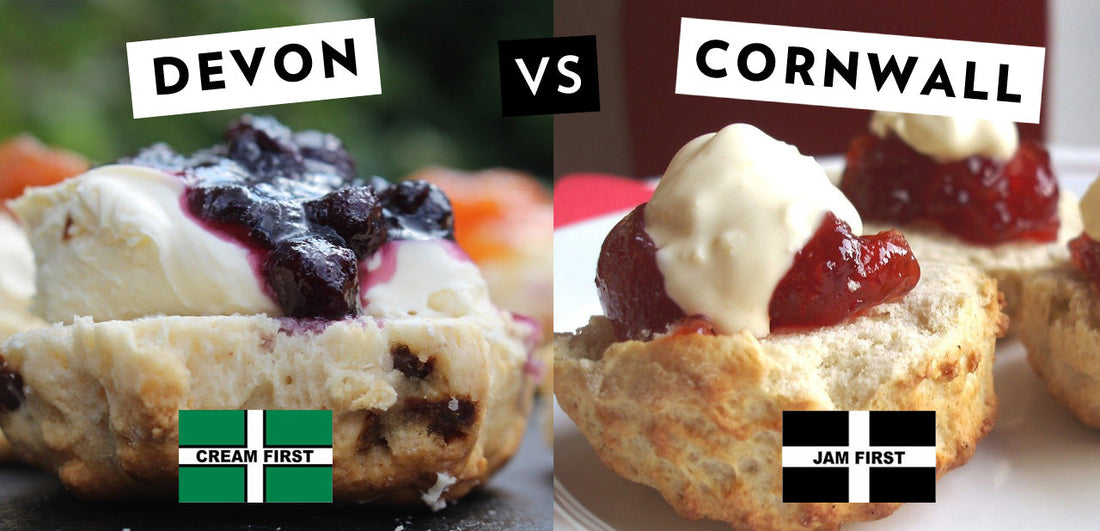The Cream Tea Conundrum: Devon vs Cornwall
In the picturesque landscapes of southwestern England, where rolling hills meet the rugged coastline, a culinary debate has brewed for centuries, dividing tea enthusiasts and sparking friendly rivalry: the age-old argument of how to assemble the perfect cream tea.

The contenders? The charming counties of Devon and Cornwall. At the heart of this dispute lies a seemingly simple choice: should one spread jam first and then top it with clotted cream (the Cornish way), or should the cream take the lead, gracing the scone before the jam (the Devonian tradition)?
As we delve into the rich history, cultural nuances, and gastronomic delights of these regions, we'll explore the origins of this delightful discourse and aim to uncover the true essence of the cream tea.
Historical Origins To fully appreciate the cream tea conundrum, one must first journey back in time to understand the cultural tapestry of Devon and Cornwall. Both regions boast a proud heritage, with each contributing unique elements to England's historical narrative.

The cream tea itself has roots in the 19th century when Anna, the Duchess of Bedford, is said to have initiated the afternoon tea ritual to stave off hunger between lunch and dinner. However, it was the southwest of England that transformed this tradition into a culinary spectacle.
Cornwall's Claim to Fame Cornwall, known for its stunning coastline, Celtic heritage, and mining history, has long been associated with the quintessential cream tea experience. Here, the Cornish tradition dictates that the scone should be adorned with a good spread of jam followed by a dollop of cornish clotted cream.

The rationale behind this method is simple: clotted cream is regarded as the crowning glory, and placing it atop the jam showcases its velvety richness. The Cream of Devon's Crop On the flip side of the Tamar River lies Devon, a county celebrated for its rolling hills, charming villages, and maritime heritage.
The Devonian cream tea adheres to a different set of rules, deeming it sacrilege to place clotted cream anywhere but atop the scone. The Battle of Tradition As with any long-standing tradition, the debate over cream tea etiquette is deeply ingrained in the cultural identity of both regions.

Locals take pride in upholding the traditions passed down through generations, and the cream tea debate has become a symbol of regional identity. It's not merely a matter of personal preference but a nod to heritage and a connection to the past. The Art of Scone Making While the argument centres on the cream and jam placement, the scone itself is an integral part of the equation.
Both Devon and Cornwall boast distinct variations of the classic scone recipe, each contributing its unique flavour and texture to the final masterpiece. In Cornwall, the traditional Cornish split, a light and fluffy scone, is the canvas for the cream tea. The split is slightly sweetened, providing a delightful contrast to the richness of the clotted cream and the sweetness of the jam.

In Devon, the scone tends to be more robust, often featuring a denser texture. This sturdier base is well-suited to bear the weight of the clotted cream, ensuring a harmonious balance of flavours and textures. Local Ingredients, Global Fame The quality of ingredients plays a pivotal role in the cream tea experience.
Both Devon and Cornwall are home to lush farmlands and dairies, contributing to the exceptional quality of the key players: clotted cream and jam. Cornwall's clotted cream, with its golden hue and indulgent consistency, is a result of the region's rich dairy farming tradition.
The cream is gently heated to allow the formation of a golden crust on top, preserving its velvety interior. This unique process imparts a distinct richness that elevates the cream tea experience. Devon's clotted cream, while equally luxurious, may differ subtly in texture and taste. Local variations in dairy farming practices and the source of milk contribute to the nuanced differences that aficionados can discern. Jam, the sweet companion to clotted cream, is another point of contention.

Cornwall leans towards the use of strawberry jam, while Devon tends to favour a more varied selection, including raspberry and blackcurrant. The choice of jam can significantly impact the overall flavour profile, adding layers of complexity to this seemingly simple treat.
Tea Time Etiquette Cream tea is not just a gastronomic delight; it's a social ritual, a pause in the day to savour the flavours and enjoy the company of others. The etiquette surrounding cream tea is as important as the ingredients themselves. In both Devon and Cornwall, tea is the preferred beverage to accompany the cream tea feast.

Whether it's a traditional black tea or a fragrant herbal infusion, the ritual of pouring and sipping adds to the overall experience. The choice of tea is a matter of personal preference, but the act of brewing and pouring is a shared cultural practice. Tea rooms and cafes across both counties take great pride in serving the perfect cream tea, and each establishment may have its own twist on the classic recipe.
From quirky variations on the traditional scone recipe to inventive flavour combinations for jams, these tea rooms contribute to the evolving narrative of the cream tea debate. Culinary Tourism: Cream Tea Trails For those eager to embark on a culinary adventure, both Devon and Cornwall offer cream tea trails that guide enthusiasts through the best establishments to experience this delightful tradition. These trails wind through charming villages, coastal towns, and bucolic landscapes, offering not only a taste of the finest cream teas but also a glimpse into the local culture and history.

In Cornwall, a cream tea trail might lead you to cliffside tea rooms overlooking the Atlantic, where the sound of crashing waves provides a soothing backdrop to your indulgence. In Devon, the trail could wind through quaint countryside villages, where thatched-roof cottages and babbling brooks create an idyllic setting for scone enthusiasts.
The Cream Tea Diplomacy Over the years, attempts have been made to reconcile the cream tea debate and bridge the gap between Devon and Cornwall. The concept of "cream tea diplomacy" has emerged, encouraging individuals to appreciate both traditions rather than staunchly aligning with one side.
Some establishments even offer a compromise, allowing patrons to choose their preferred method of cream and jam application. However, the rivalry persists, albeit in good humour. Annual events, such as the Great Cream Tea Debate, draw locals and tourists alike, encouraging participants to vote for their preferred method and celebrating the diversity of this beloved tradition.
Conclusion: A Shared Heritage As we conclude our exploration of the Devon vs Cornwall cream tea debate, it becomes evident that this friendly rivalry is not merely a culinary quirk but a testament to the rich cultural heritage of these regions. The cream tea is more than a sumptuous treat; it's a connection to the past, a celebration of local ingredients, and a shared experience that transcends generations.
Whether you find yourself on the cliffs of Cornwall or in the rolling hills of Devon, take a moment to savour the flavours of a well-made cream tea. Appreciate the nuances of clotted cream and the sweetness of jam, and perhaps, in that moment of indulgence, you'll find a newfound appreciation for both traditions. After all, in the grand tapestry of British culinary heritage, the cream tea debate is but a small, yet delightful, thread.

